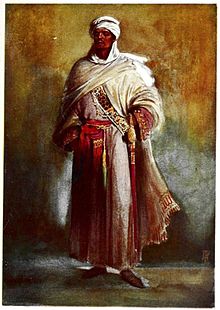Othello is a tragedy by William Shakespeare, believed to have been written in 1603. It is based on the story Un Capitano Moro, first published in 1565. The story revolves around four central characters: Othello, a Moorish general in the Venetian army; his beloved wife, Desdemona; his loyal lieutenant, Cassio; and his trusted but ultimately unfaithful ensign, Iago. Given its varied and enduring themes of racism, love, jealousy, betrayal, revenge and repentance, Othello is still often performed in professional and community theatre alike, and has been the source for numerous operatic, film, and literary adaptations.
Plot
Act I
Roderigo, a wealthy and dissolute gentleman, complains to his friend Iago, an ensign, that Iago has not told him about the secret marriage between Desdemona, the daughter of a Senator named Brabantio, and Othello, a Moorish general in the Venetian army. Roderigo is upset because he loves Desdemona and had asked her father for her hand in marriage.Iago hates Othello for promoting a younger man named Cassio above him, whom Iago considers less capable a soldier than himself, and tells Roderigo that he plans to use Othello for his own advantage. Iago convinces Roderigo to wake Brabantio and tell him about his daughter's elopement. Meanwhile, Iago sneaks away to find Othello and warns him that Brabantio is coming for him.
Brabantio, provoked by Roderigo, is enraged and will not rest until he has beheaded Othello, but he finds Othello's residence full of the Duke of Venice's guards, who prevent violence. News has arrived in Venice that the Turks are going to attack Cyprus; therefore Othello is summoned to advise the senators. Brabantio has no option but to accompany Othello to the Duke's residence, where he accuses Othello of seducing Desdemona by witchcraft.
Othello defends himself before the Duke of Venice, Brabantio's kinsmen Lodovico and Gratiano, and various senators. Othello explains that Desdemona became enamoured of him for the sad and compelling stories he told of his life before Venice, not because of any witchcraft. The senate is satisfied, once Desdemona confirms that she loves Othello, but Brabantio leaves saying that Desdemona will betray Othello: "Look to her, Moor, if thou hast eyes to see:/She has deceived her father, and may thee." Iago, still in the room, takes note of Brabantio's remark. By order of the Duke, Othello leaves Venice to command the Venetian armies against invading Turks on the island of Cyprus, accompanied by his new wife, his new lieutenant Cassio, his ensign Iago, and Iago's wife, Emilia, as Desdemona's attendant.
Act II
The party arrives in Cyprus to find that a storm has destroyed the Turkish fleet. Othello orders a general celebration and leaves to consummate his marriage with Desdemona. In his absence, Iago gets Cassio drunk, and then persuades Roderigo to draw Cassio into a fight. Montano tries to calm an angry and drunk Cassio down, but end up fighting one another. Montano is injured in the fight. Othello reenters and questions the men as to what happened. Othello blames Cassio for the disturbance and strips him of his rank. Cassio is distraught. Iago persuades Cassio to importune Desdemona to convince her husband to reinstate Cassio.Act III
Iago now persuades Othello to be suspicious of Cassio and Desdemona. When Desdemona drops a handkerchief (the first gift given to her by Othello), Emilia finds it, and gives it to her husband Iago, at his request, unaware of what he plans to do with it. Othello reenters and vows with Iago for the death of Desdemona and Cassio, after which he makes Iago his lieutenant. Act III, scene iii, is considered to be the turning point of the play as it is the scene in which Iago successfully sows the seeds of doubt in Othello's mind, inevitably sealing Othello's fate.Act IV
Iago plants the handkerchief in Cassio's lodgings, then tells Othello to watch Cassio's reactions while Iago questions him. Iago goads Cassio on to talk about his affair with Bianca, a local courtesan, but whispers her name so quietly that Othello believes the two men are talking about Desdemona. Later, Bianca accuses Cassio of giving her a second-hand gift which he had received from another lover. Othello sees this, and Iago convinces him that Cassio received the handkerchief from Desdemona.Enraged and hurt, Othello resolves to kill his wife and asks Iago to kill Cassio. Othello proceeds to make Desdemona's life miserable, hitting her in front of visiting Venetian nobles. Meanwhile, Roderigo complains that he has received no results from Iago in return for his money and efforts to win Desdemona, but Iago convinces him to kill Cassio.
Act V
Roderigo, having been manipulated by Iago, attacks Cassio in the street after Cassio leaves Bianca's lodgings. Cassio wounds Roderigo. During the scuffle, Iago comes from behind Cassio and badly cuts his leg. In the darkness, Iago manages to hide his identity, and when Lodovico and Gratiano hear Cassio's cries for help, Iago joins them. When Cassio identifies Roderigo as one of his attackers, Iago secretly stabs Roderigo to stop him revealing the plot. Iago then accuses Bianca of the failed conspiracy to kill Cassio.Othello confronts Desdemona, and then strangles her to death in their bed. When Emilia arrives, Othello accuses Desdemona of adultery. Emilia calls for help. The former governor Montano arrives, with Gratiano and Iago. When Othello mentions the handkerchief as proof, Emilia realizes what her husband Iago has done, and she exposes him, whereupon he kills her. Othello, belatedly realising Desdemona's innocence, stabs Iago but not fatally, saying that he would rather have Iago live the rest of his life in pain.
Iago refuses to explain his motives, vowing to remain silent from that moment on. Lodovico apprehends both Iago and Othello for the murders of Roderigo and Emilia, but Othello commits suicide. Lodovico appoints Gratiano Othello's successor and exhorts Cassio to punish Iago justly.







No comments:
Post a Comment